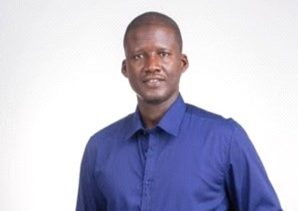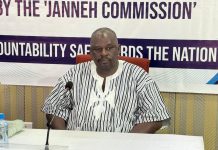By Kebba AF Touray
Alhagie Mamadi Kurang, former Secretary to the Janneh Commission, appeared before the National Assembly’s Special Select Committee on Wednesday and described how delays in funding, administrative setbacks, and lack of independence hampered the commission’s investigation into the assets of former President Yahya Jammeh.
Kurang told lawmakers that while the commission was tasked with a major national assignment — identifying, valuing, and recovering Jammeh’s assets — it operated without its own budget and was dependent on the Ministry of Justice for every essential item, from office stationery to expert services.
Lead Counsel Lamin M. Dibba began by asking Kurang about his initial engagement with the Attorney General. Kurang confirmed they met prior to his appointment, where he was informed he had been selected for the role based on specific criteria. “They were looking for a candidate that fits a certain profile,” Kurang said. “Someone who had not worked directly with the former President Jammeh, someone who had lived and worked in The Gambia during his 22-year rule, and someone who understood finance.”
At the end of that meeting, the Attorney General told Kurang he was being recommended as Secretary and asked if he would take the job.
Setting Up the Commission
Describing the commission’s early days, Kurang said its first meetings focused on basic needs. “We raised issues such as the need for stationery, security for the members, appointment letters, and other logistical matters to be taken up with the Solicitor General,” he said.
One meeting, attended by Chairman Sourahata Janneh and Commissioners Bia Mass Saine and Abiosseh George, addressed formal procedures. The group agreed on a name — The Commission of Inquiry Into the Assets of Ex-President Yahya AJJ Jammeh, Family and Close Associates — and resolved that only the Secretary would speak to the media, and only with prior clearance from the Chairman. “The members all resolved to adopt a policy of no interviews to the media,” Kurang said.
When asked if the commission had a working budget, Kurang explained that they had submitted a proposal to the Attorney General and shared it with other members, including the Lead Counsel. But the Ministry of Justice retained full control over the budget.
“We were told that the budget would be controlled by the Ministry of Justice,” Kurang testified. “We would make requests as and when required.”
According to him, an accountant at the Ministry of Justice, Alagie Babou Joof, handled all disbursements.
“He was not part of the commission. He comes there when we need something, and he comes there when he has to deliver something to us,” Kurang said. “He was an accountant at the Ministry of Justice and remains at the Ministry.”
Kurang told the committee that this arrangement delayed many of the commission’s activities. “The fact that the commission did not have any control over its budget affected or delayed a lot of things. Requests could be made to administratively run the base, but they tend to be delayed. This made the staff feel demotivated.”
Asked about the commission’s legal structure, Kurang admitted he never saw an official organogram but observed that most of the legal team were police officers. “I did not see the organogram because they fall under the Lead Counsel, but dealing with them I have seen that they were usually policemen.”
He also clarified that not all information flowing through him as Secretary was shared with the commissioners. “Information that came through me was for the Counsel, and not all information for the Counsel was for the commissioners.”
The commission was tasked with valuing a wide range of assets: from land to livestock to vehicles. Kurang explained that the commission brought in experts from across government departments to carry out these assessments.
“There was a whole set of experts coming to the commission directly to the Lead Counsel from every department in the country,” he said.
For land, the Department of Lands and Surveys provided valuers. For livestock, the Livestock Department was engaged. Kurang said he worked closely with a valuer from the Gambia Livestock Management Agency (GLMA) and with a vehicle expert, Mr. Njie, former Managing Director of the Maintenance Service Agency in Kotu. Njie valued tractors that had arrived from India.
When asked how these experts were selected, Kurang said they were either recommended or appointed following guidance from the commission. “There was a guidance given by the commission as to what they were ready to pay for valuation, and that guidance would have determined that.”
Kurang also confirmed that the commission acted under the authority of a high court order that existed even before its formal establishment. This interim order empowered the commission to direct valuations and safeguard Jammeh’s seized properties.
“The Counsel’s office would prepare an application, it would be endorsed by the Chairman, and then the order would follow suit,” Kurang said. In some cases, such as the valuation of cattle, the court orders specifically named the Department of Livestock as the responsible institution.
Kurang said he also saw a similar order for tractors. However, he noted that he left the commission within its first year and was not involved in many of the later valuation exercises. “So I would not know what happened,” he said.
Kurang also cited a disturbing report from the Registrar General. “One Major Giril Jammeh had slaughtered 400 cattle for an unknown purpose,” he said, referring to animals that were supposed to be under government custody as part of the asset recovery effort.
He confirmed that his interactions with the Registrar General and the GLMA were part of the commission’s process of tagging and valuing seized livestock.
Despite its legal mandate and high public expectations, Kurang said the commission suffered from inefficiencies caused by its dependence on the Justice Ministry. “I did not see much oversight activity [from the Ministry],” he said. “Rather, it was more of facilitation of the needs of the commission.”
He emphasized that while the commission had the authority to act, delays in securing the tools and experts they needed hindered their progress.
Alhagie Mamadi Kurang is expected to return before the Special Select Committee on Thursday, July 17, 2025, for further testimony.



















